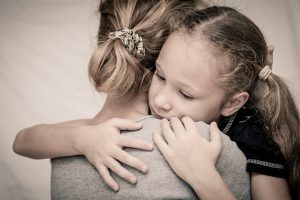I am a huge fan of Domestic Shelters. Not only can they help abuse victims find shelters all over the United States, they also post pertinent articles about domestic violence every week in their blog. They recently published a resource called What About My Kids?
This subject is very close to my heart. I have heard too many sad stories about abuse survivors who are fighting their abusers in court for the custody of their children. I used to be shocked to hear that an abuser who had committed hideous crimes against his/her partner and their children would get partial or even full custody of those same children. Sadly, I have moved beyond shock. I am still sickened by these stories, but no longer surprised – it happens too often. I have written many blogs about this, trying to give abuse survivors hope. Today, I would like to share some resources listed by Domestic Shelters.
Help for Children of Domestic Violence
What About My Kids? first includes articles to help children who have witnessed domestic violence. One of these articles, When Children Witness Violence, talks about the fact that boys that witness violence in the home are twice as likely (as boys who haven’t witnessed violence) to abuse their partners in adulthood. What can a parent do to help prevent this? Domestic Shelters writes:
“According to the National Child Traumatic Stress Network (NCTSN), the most important step to take when children are exposed to domestic violence is to remove them from the situation and place them where they feel safe, as well as making sure they see their abused parent or caregiver is safe. Also, helping them to plan strategies for staying safe gives them a sense of control and helps them feel less vulnerable.
“Next, counseling is recommended. Based on their age, this could include group counseling or support groups, individual counseling and counseling in tandem with the non-offending parent. Says NTCSN, ‘For most children, a strong relationship with a parent is a key factor in helping a child heal from the effects of domestic violence.’”
In another article, entitled Brain Changes, they list some actions that can help the brain of a child who has witnessed violence heal:
“Helping Kids Heal
The first step in helping kids recover from exposure to domestic violence is to end the exposure. “It’s a terrible thing no matter who is being violent, but when it’s a person you count on to be your protector, it’s profoundly unsettling to your basic sense of safety and security in the world,” says Cohen. Once they are in a safe place, there are various strategies that can help children who were exposed to domestic violence begin to heal.
- Give them lots of love and affection.
- Let them have their own feelings.
- Be reassuring but honest.
- Share your coping strategies.
- Encourage gentle physical activity.
- Have them care for an animal.
- Interrupt inappropriate behavior.
- Let them play.
- Help them find therapy.
- Respect their feelings about themselves, related to the abuser.”
Court and Custody Issues
What About My Kids? has several articles on how to deal with family court and custody issues. One is called Mom’s: Protect Yourself in Court. In this article, they give some very good advice. This is something I have never heard before:
“Watch out for the set-up. “There are certain ways abusers will set mothers up outside of court,” says Shanahan.  Tweet This
Tweet This
One way is by suggesting, in a seemingly caring manner, that their ex-partner seeks some sort of therapy or treatment for an issue, like depression or alcohol dependency. But once in court, they’ll suggest to the judge that the mother has issues that makes them unfit.
“That’s not to say, of course, that survivors should avoid seeking counseling or therapy when needed. But it helps to have a domestic violence advocate as an ally to testify the survivor was receiving this help as a way to deal with the aftermath of abuse, and to see a therapist trained specifically in domestic violence issues.”
They also suggest:
- Keep your cool in court.
- Be willing to do your homework.
- Do whatever you can to not give up.
What About My Kids? lists several books that can help non-abusive parents get and do the best for their kids:
The Batterer as Parent: Addressing the Impact of Domestic Violence on Family Dynamics. This book takes into account the complex ways in which a batterer’s abusive and controlling behaviors are woven into the fabric of daily life. This book is a guide for therapists, child protective workers, and other human services providers in addressing the complex impact that batterers– specifically, male batterers of a domestic partner when there are children in the household– have on family functioning.
Mothers on Trial: The Battle for Children and Custody. This landmark book was the first to break the false stereotypes about mothers getting preferential treatment over fathers when it comes to custody. In fact, when both fathers and mothers want custody, the father usually gets it.



